
Taking a break from blogging. Most of my free cyber time now spent on Second Life... which goes in the category of things that fascinate and amaze me.
Maybe I'll be back...or maybe not. Time will tell.
a gringa in algeria & beyond...
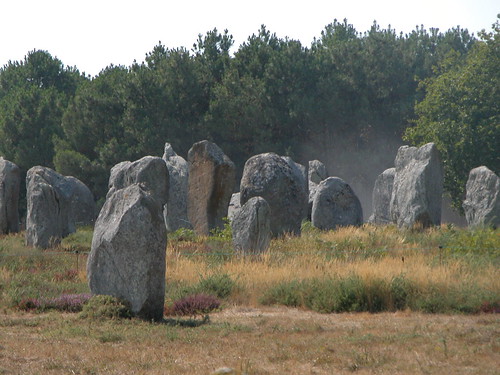 You may have heard of Carnac... no, not "Carnac the Magnificent" the Johnny Carson (I can hear many young people saying "Who?") character. This Carnac is in Brittany (France) and is, in many opinions, the most important megalithic site in the world, surpassing Stonehenge. It's comprised of thousands (as in over 3,000) prehistoric megaliths (from the Greek meaning "large stone") which were placed sometime between 3,300 and 4,500 B.C. Standing amidst the stones, placing your hand on them and looking at the vast field of perfectly placed menhirs (some up to 180 tons) is a truly unique experience.
You may have heard of Carnac... no, not "Carnac the Magnificent" the Johnny Carson (I can hear many young people saying "Who?") character. This Carnac is in Brittany (France) and is, in many opinions, the most important megalithic site in the world, surpassing Stonehenge. It's comprised of thousands (as in over 3,000) prehistoric megaliths (from the Greek meaning "large stone") which were placed sometime between 3,300 and 4,500 B.C. Standing amidst the stones, placing your hand on them and looking at the vast field of perfectly placed menhirs (some up to 180 tons) is a truly unique experience.  I don't usually borrow from other blogs, but saw something so shocking on Svend White's thoughtful and incisive blog called Akram's Razor (link added to my list) about the Danish People's Party's new campaign targeting Muslim women.
I don't usually borrow from other blogs, but saw something so shocking on Svend White's thoughtful and incisive blog called Akram's Razor (link added to my list) about the Danish People's Party's new campaign targeting Muslim women. If you as a Muslim woman free yourself from old Muslim traditions that require you to submit to male family members, you can become an independent woman and member of modern society. A woman who is not dependent on a man. A woman able to create for herself a career on the job market and not just stand over the stove or serve as a baby machine. You can show your children what a woman's potential is by having a job, home, and family while remaining a good mother. Women in the West have done it for decades. We live well and are thriving. You can be one of us.
 Fifty years after "West Side Story" filled the stage, the Israeli-American filmmaker Ari Sandel brings his reinterpretation, "West Bank Story," to the world. Winner of the Oscar for Best Live Action Short Film, it's available for download for a mere $1.99 (or so it was at press time) from iTunes.
Fifty years after "West Side Story" filled the stage, the Israeli-American filmmaker Ari Sandel brings his reinterpretation, "West Bank Story," to the world. Winner of the Oscar for Best Live Action Short Film, it's available for download for a mere $1.99 (or so it was at press time) from iTunes. 
 Nothing really to blog about. Thinking a lot about the movies I saw this weekend, Babel and The Last King of Scotland. Both haunting and frightening.
Nothing really to blog about. Thinking a lot about the movies I saw this weekend, Babel and The Last King of Scotland. Both haunting and frightening. 
Thousands of hectares have been contaminated, and the region is still dangerous for humans and the animals. Our goal today is to show our invitees what happened here, and we should also mobilise public opinion on this issue.
 OK, I won't say the words, but let's just say that one starts with "hij" and is the arabic word describing a certain headcovering and the second starts with the letter "s" and ends in an "x." The reason I won't say the words is that those words, which I included in a previous post, have generated a ridiculous amount of traffic to my blog, originating from a google search containing both...and most of these come from the middle east! So that leads me to believe that perhaps the covering meant to show modesty is actually the object of desire to many....ewwwwww!
OK, I won't say the words, but let's just say that one starts with "hij" and is the arabic word describing a certain headcovering and the second starts with the letter "s" and ends in an "x." The reason I won't say the words is that those words, which I included in a previous post, have generated a ridiculous amount of traffic to my blog, originating from a google search containing both...and most of these come from the middle east! So that leads me to believe that perhaps the covering meant to show modesty is actually the object of desire to many....ewwwwww!
 An age-old battle has been revived in Spain, in Córdoba, to be exact, between the cristianos and the moros. Ever since Mansur Escudero, president of the Islamic Board, asked the Catholic hierarchy permission to allow Muslims to perform their individual prayers in the famous Mezquita de Córdoba, a war of words has followed, as evident in the press and in internet forums.
An age-old battle has been revived in Spain, in Córdoba, to be exact, between the cristianos and the moros. Ever since Mansur Escudero, president of the Islamic Board, asked the Catholic hierarchy permission to allow Muslims to perform their individual prayers in the famous Mezquita de Córdoba, a war of words has followed, as evident in the press and in internet forums. 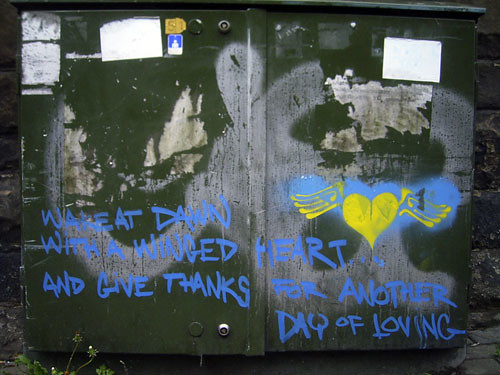
 The UNAF (The Union of French Apiarists) is getting the word out about their project “The Bee, sentinel of the Environment” which promotes urban beekeeping, or putting hives on rooftops in cities all over France...and beyond. So far, the results have been impressive. Sounds nice, right? But what’s really disturbing is their reason for doing this: to save the ever-dwindling bee population, decimated by their lives in the country where they buzz about in bliss amongst all kinds of pesticides.
The UNAF (The Union of French Apiarists) is getting the word out about their project “The Bee, sentinel of the Environment” which promotes urban beekeeping, or putting hives on rooftops in cities all over France...and beyond. So far, the results have been impressive. Sounds nice, right? But what’s really disturbing is their reason for doing this: to save the ever-dwindling bee population, decimated by their lives in the country where they buzz about in bliss amongst all kinds of pesticides.  The UN High Commissioner for Refugees (UNHCR) and the World Food Program (WFP) have sounded the alert about the conditions of the Sahrawi refugee camps in Tindouf, Algeria. These camps, comprised of between 160,000 and 200,000 (depending in whose estimates you believe) Sahrawis, house those who fled the Western Sahara when it was ceded by the then colonial power, Spain, to Morocco and Mauritania in 1975. This makes the Tindouf camps among those with the longest duration, not a very admirable title.
The UN High Commissioner for Refugees (UNHCR) and the World Food Program (WFP) have sounded the alert about the conditions of the Sahrawi refugee camps in Tindouf, Algeria. These camps, comprised of between 160,000 and 200,000 (depending in whose estimates you believe) Sahrawis, house those who fled the Western Sahara when it was ceded by the then colonial power, Spain, to Morocco and Mauritania in 1975. This makes the Tindouf camps among those with the longest duration, not a very admirable title. I don’t know if it’s that I have a habit of living in and traveling to places where there is an autochthonous cultural and linguistic people who struggle against the powers that be, or if it’s just that I’m drawn to their struggles, but here I am, once again faced with the same, or similar issues.
I don’t know if it’s that I have a habit of living in and traveling to places where there is an autochthonous cultural and linguistic people who struggle against the powers that be, or if it’s just that I’m drawn to their struggles, but here I am, once again faced with the same, or similar issues.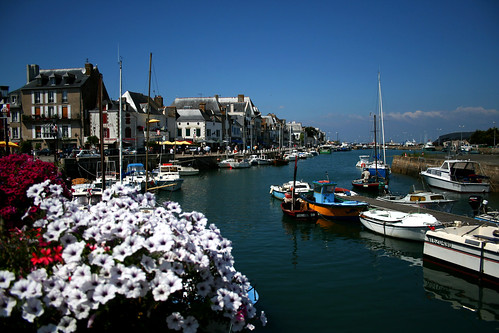 After a week in France, I feel like I'm on another planet. Better said, I feel probably as close to a North African immigrant as possible for a gringa like me. Everythings seems so, well, civilized. Clean, sanitized, polite, organized, formal. The apartment is in a 15th-century building (found that out when large groups of young children, pads in hands, convened under my window looking up and sketching the façade), the food is amazing (except for the fact that I have to keep my pork-radar on permanent alert...it's everywhere), and life is good. That said, I do miss Algeria...really I do. Will be happy to get back there this summer, but in the meantime will enjoy eating lots of crepes, traveling around, saying a lot of "bonjour madame's" and walking freely around for hours without anyone once looking at me oddly. Oh, and there's amazing merguez and couscous here, so I won't feel that lonesome for el Djazair!
After a week in France, I feel like I'm on another planet. Better said, I feel probably as close to a North African immigrant as possible for a gringa like me. Everythings seems so, well, civilized. Clean, sanitized, polite, organized, formal. The apartment is in a 15th-century building (found that out when large groups of young children, pads in hands, convened under my window looking up and sketching the façade), the food is amazing (except for the fact that I have to keep my pork-radar on permanent alert...it's everywhere), and life is good. That said, I do miss Algeria...really I do. Will be happy to get back there this summer, but in the meantime will enjoy eating lots of crepes, traveling around, saying a lot of "bonjour madame's" and walking freely around for hours without anyone once looking at me oddly. Oh, and there's amazing merguez and couscous here, so I won't feel that lonesome for el Djazair!
 Mentioned in an earlier post that I'd been checking out the virtual world at secondlife.com.
Mentioned in an earlier post that I'd been checking out the virtual world at secondlife.com. 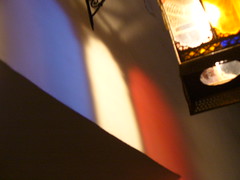 ...the colonial ex-master that is. Yes, getting ready to leave the bled and spend some time in France.
...the colonial ex-master that is. Yes, getting ready to leave the bled and spend some time in France. 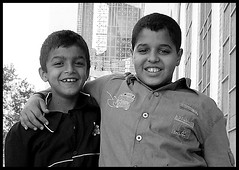 Was people watching the other day, from the car, as we drove around town. (Sometimes I dream about hiding behind a veil...just for one day, so I can watch without being noticed.) Was struck by the physicality of the relationship between young men here. Women too, but Constantine is a man's paradise and, especially after a certain hour (we call it the unofficial "curfew" for women, slightly before dark), 99% of the people you see in the street are men.
Was people watching the other day, from the car, as we drove around town. (Sometimes I dream about hiding behind a veil...just for one day, so I can watch without being noticed.) Was struck by the physicality of the relationship between young men here. Women too, but Constantine is a man's paradise and, especially after a certain hour (we call it the unofficial "curfew" for women, slightly before dark), 99% of the people you see in the street are men.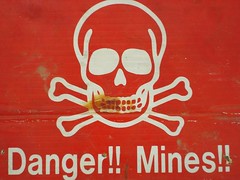 The government announced today that of the 11 million landmines planted during WWII, the war of independence from France and the insurgency of the 1990’s, 3 million remain along the Algerian borders. These mines contaminate nearly 60 square kilometers along over 1000 kilometers of border on the East with Tunisia and West with Morocco.
The government announced today that of the 11 million landmines planted during WWII, the war of independence from France and the insurgency of the 1990’s, 3 million remain along the Algerian borders. These mines contaminate nearly 60 square kilometers along over 1000 kilometers of border on the East with Tunisia and West with Morocco. The Italian circus "Il Florilegio" announced in a press conference yesterday in Algiers that they will return with their tents this summer to Algeria. This is the 5th year that the circus has appeared here.
The Italian circus "Il Florilegio" announced in a press conference yesterday in Algiers that they will return with their tents this summer to Algeria. This is the 5th year that the circus has appeared here.
 Just discovered, albeit ironically via itunes, the Touareg group Tinariwen. From Mali, these musicians are all former Touareg rebels who in the 80's lived in refugee and military training camps in Algeria & Libya and in the 90's, when peace was established, put down their guns and picked up guitars...lucky for us.
Just discovered, albeit ironically via itunes, the Touareg group Tinariwen. From Mali, these musicians are all former Touareg rebels who in the 80's lived in refugee and military training camps in Algeria & Libya and in the 90's, when peace was established, put down their guns and picked up guitars...lucky for us.